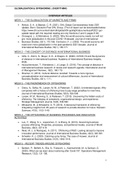GLOBALISATION & OFFSHORING | EVERYTHING
OVERVIEW ARTICLES
WEEK 1 – THE GLOBALIZATION OF MARKETS AND FIRMS
• Altman, S. A., & Bastian, C. R. (2021). DHL Global Connectedness Index 2021
Update. Bonn: Deutsche Post DHL Group. (The full report can be downloaded below:
https://www.dhl.com/content/dam/dhl/global/dhl-spotlight/documents/pdf/2021-gci-
update-report.pdf; the required reading are only Sections 2 and 3: pages 9-30)
• Ciravegna, L., & Michailova, S. (2022). Why the world economy needs, but will not
get, more globalization in the post-COVID-19 decade. Journal of International
• Business Studies, 53(1), 172-186. Contractor, F. J. (2022). The world economy will
need even more globalization in the post-pandemic 2021 decade. Journal of
International Business Studies, 53(1), 156-171.
WEEK 2 – THE CONCEPT OF DISTANCE IN INTERNATIONAL BUSINESS
• Côté, C., Estrin, S., Meyer, K. E., & Shapiro, D. (2020). COVID-19 and the dynamics
of distance in international business. Academy of International Business Insights,
20(3).
• Hutzschenreuter, T., Kleindienst, I., & Lange, S. (2016). The concept of distance in
international business research: A review and research agenda. International Journal
of Management Reviews, 18(2), 160-179.
• Shenkar, O. (2012). Cultural distance revisited: Towards a more rigorous
conceptualization and measurement of cultural differences. Journal of International
Business Studies, 43(1), 1-11.
WEEK 3 – THE PHENOMENON OF OFFSHORING
• Grecu, A., Sofka, W., Larsen, M. M., & Pedersen, T. (2022). Unintended signals: Why
companies with a history of offshoring have to pay wage penalties for new hires.
Journal of International Business Studies, 53(3), 534-549.
• Larsen, M. M., Manning, S., & Pedersen, T. (2013). Uncovering the hidden costs of
offshoring: The interplay of complexity, organizational design, and experience.
Strategic Management Journal, 34(5), 533-552.
• Mihalache, M., & Mihalache, O. R. (2016). A decisional framework of offshoring:
Integrating insights from 25 years of research to provide direction for future. Decision
Sciences, 47(6), 1103-1149.
WEEK 4 – THE OFFSHORING OF BUSINESS PROCESSES AND INNOVATION
ACTIVITIES
• Luo, Y., Wang, S. L., Jayaraman, V., & Zheng, Q. (2013). Governing business
process offshoring: Properties, processes, and preferred modes. Journal of World
Business, 48(3), 407-419.
• Nieto, M. J., & Rodríguez, A. (2011). Offshoring of R&D: Looking abroad to improve
innovation performance. Journal of International Business Studies, 42(3), 345-361.
• Schaefer, K. J. (2020). Catching up by hiring: The case of Huawei. Journal of
International Business Studies, 51(9), 1500-1515.
WEEK 5 – RECENT TRENDS AROUND OFFSHORING
• Barbieri, P., Boffelli, A., Elia, S., Fratocchi, L., Kalchschmidt, M., & Samson, D.
(2020). What can we learn about reshoring after Covid-19?. Operations Management
Research, 13(3), 131-136.
1
,GLOBALISATION & OFFSHORING | EVERYTHING
• Pegoraro, D., De Propris, L., & Chidlow, A. (2022). Regional factors enabling
manufacturing reshoring strategies: A case study perspective. Journal of International
Business Policy, 5, 112-133.
• Valentino, A., Schmitt, J., Koch, B., & Nell, P. C. (2019). Leaving home: An
institutional perspective on intermediary HQ relocations. Journal of World Business,
54(4), 273-28
2
, GLOBALISATION & OFFSHORING | EVERYTHING
WEEK 1 – THE GLOBALIZATION OF MARKETS AND FIRMS
1.1 The world economy will need even more globalization in the post-pandemic 2021 decade
(Farok J. Contractor, 2022)
Into the long future, the world will remain fragmented and unequal in terms of income,
culture, laws, institutions, and business practices.
MNEs are operating a cross-border bridging and they will benefit these firms, but also the
citizens and companies in host actions to which better managerial, productivity, technological
and institutional practices are demonstrated.
Main idea: changes induced by heightened nationalism and protectionism during the recent
years will be just marginal rather than fundamental in nature.
• MNEs can easily handle and ameliorate the marginally higher risks by using alternate
cross-border business strategies and emerging technologies.
• The skewed distribution of national economic size and inequality will continue to
justify the existence of MNEs → dis-internalization (outsourcing) and dispersion
internationally (offshoring) will remain a powerful competitive mandate.
The reconfiguration of GVCs will be small or marginal because:
1. Much of globalization is driven by competition between companies based on price
and cost. Only a marginal increase in GVC cost can be tolerated.
2. Supply chain risk can be mitigated by digital technologies (Blockchain, integration of
vendor-buyer computer systems and artificial intelligence)
Sensitivity to risk will increase in the post-pandemic era, there will be countervailing risk-
reducing effects from new technologies which will reduce risks by improving the
management and coordination of foreign supplier systems.
The indispensable role played by the MNEs as a bridging agent that aggregated demand
and arbitrage differences across nations, as well as orchestrates and conduits the cross-
border flows of capital, goods and services and intellectual assets will not diminish, but
remain even more needed in a post-pandemic world.
MNEs also play a role as a catalyst of higher institutional, governance, sustainability, HRM,
environmental and ethics standards, both through its own affiliate network and by its external
influence in countries that still have to catch up with best practices.
1.2 Why the world economy needs, but will not get, more globalization in the post-COVID-19
decade (Ciravegna and Michailova, 2022)
1. Inter- and intra-country inequalities increased and has reversed trends in poverty
reduction → intensify anti-globalism sentiments.
2. Fueled populism, nationalism, and return to the interventionist state in the economy
3. Governmental responses to the Covid-19 crisis have undermined the multilateral
institutions that have thus far facilitated globalization
➔ Global uncertainty increased and cost in international transaction increased.
➔ Less globalized and more regionally fragmented world economy formed.
Covid-19 had direct impacts on protectionism and has stimulated calls for reduced
dependency on imported products and components.
3




